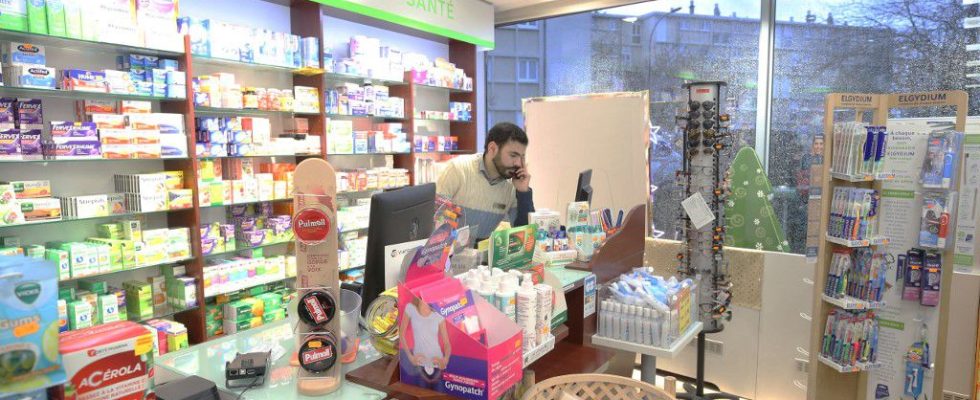On paper, expanding pharmacists’ prerogatives seems like a good idea. In fact, it adds an additional burden to health professionals who are already suffering from a lack of resources – their costs having increased due to inflation – and could once again face a triple epidemic, Covid-19, bronchiolitis and flu this fall.
A month ago, Prime Minister Elisabeth Borne announced that pharmacists were now authorized to prescribe antibiotics to patients with urinary infections or tonsillitis. A few weeks earlier, a decree officially opened all stages of vaccination to pharmacists – as well as nurses and midwives – for the prescription or injection of all compulsory and recommended vaccines.
For the executive, the objective is clear: to relieve congestion in medical offices and emergencies, and to free up medical time at a time when there is a severe shortage of doctors. In 2022, two thirds of doctors reported having refused new patients as treating physicians. They were 53% in 2019, according to the report from the Directorate of Research, Studies, Evaluation and Statistics (Drees) published on May 25. The triple epidemic of Covid, flu and bronchiolitis last year highlighted the lack of healthcare personnel.
“Adherence to vaccination prevention”
If the prospect of a joint resurgence of these epidemics this fall frightens doctors, like the epidemiologist and director of the Institute of Global Health Antoine Flahault, interviewed by L’Express on September 25, the hope of pharmacists in The effectiveness of vaccination and preventive treatment of bronchiolitis remains high. “We have reason to be optimistic this year. Support for vaccination prevention is increasingly strong. Stocks of Beyfortus, preventive treatment for bronchiolitis for infants, have also been liquidated in pharmacies which are obliged to place new orders”, notes Martial Fraysse, doctor of pharmacy and member of the National Academy of Pharmacy. And added: “The health crisis has led to a paradigm shift within the population which is less suspicious than before. People are more interested in products which are of quality and safe for prevention”.
But even if pharmacies are not faced with strong waves of epidemics this year, can they carry out their new missions? “The problem is not knowing if we are capable of doing it, but rather how can we do it? Because we are being asked to do more with fewer means,” breathes Pierre-Olivier Variot, president of the Union of Community Pharmacists’ Unions (USPO), interviewed by L’Express. Although the resources allocated to pharmacies increased during the health crisis, they have since decreased. In a survey whose results were revealed at a press conference on pharmacy compensation this week, the president of the USPO explained that 90% of pharmacies have seen their cash flow deteriorate.
“For 20 minutes of work, a pharmacist is paid 5 euros”
The reasons for this decline are multiple, but the increase in salary costs due to inflation is particularly singled out. The rise in energy prices affects the pharmaceutical sector which needs electricity to produce medicines and their containers “but we often forget this”, according to Philippe Denry, vice-president of the Fédération des Syndicats Pharmaceutiques de France (FSPF). “Carrying out vaccination boosters or carrying out angina tests to find out whether or not we are dispensing an antibiotic is important and we are willing to do that. But today, for 20 minutes of work, a pharmacist is paid 5 euros, this is not no longer possible”, underlines Pierre-Olivier Variot.
A reality which in no way helps the decline in attractiveness of the profession. Over the last three years, nearly 3,000 places have not been filled in the second year of the pharmacy faculty, with nearly 471 places in 2023. “There is a shortage of approximately one professional per pharmacy, or nearly 20,000 people, which which is enormous, admits Martial Fraysse. The sector would perhaps be less tense if pharmacists did not waste hours every week doing accounting in search of products in shortage. But that’s another problem…” France, the number of reports of stock shortages of medicines and risks of stock shortages reached unprecedented levels in 2022. In 2023, 37% of French people declared having been faced with shortages of medicines, according to the Commission of Senate drug shortage investigation.
In November, the economic aspect of the conventional negotiations between the profession and health insurance must open. The objective is simple: that the inflation suffered by pharmacies and their lack of staff is taken into account. “We want pharmacy technicians to be fully involved in helping pharmacies,” assures Philippe Denry. Because in the long term, the risk is that pharmacy will no longer attract new generations at all: “We appreciate being entrusted with new missions but if our salary policy is not dynamic enough, we will no longer be competitive. Pharmacists work on weekends, they are always on their feet and do not have the right to telework so if on top of that we are poorly paid… The job is beautiful but everyone has to find their way in it.”
